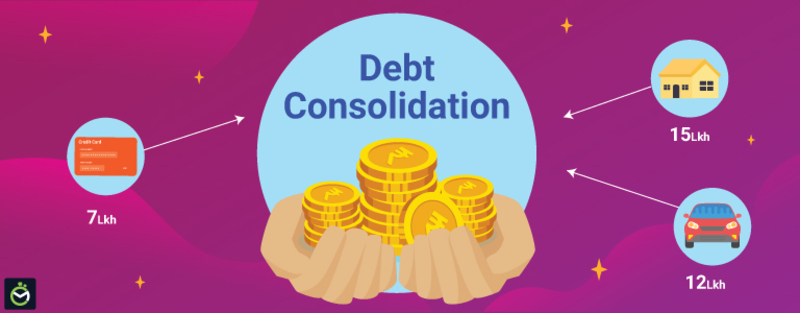In this guide, we’ll explore the best debt consolidation programs available in 2025, how they work, and how to choose the right one for your needs.
What Is a Debt Consolidation Program?
A debt consolidation program is a financial tool designed to simplify your debt repayment process. It works by combining multiple high-interest debts—like credit card balances—into one manageable monthly payment, often at a reduced interest rate. This approach not only makes it easier to keep track of your payments but also helps you save money on interest over time.
Debt consolidation can be done in several ways, including through a debt management plan, a debt consolidation loan, or a debt settlement program. Each option has its own pros and cons, and the best choice depends on your financial situation and goals.
If you’re only able to make minimum payments on your credit cards or feel overwhelmed by multiple bills, a debt consolidation program could be the key to regaining control of your finances.
Types of Debt Consolidation Programs

There are three main types of debt consolidation programs:
- Nonprofit Debt Consolidation
- Debt Consolidation Loans
- Debt Settlement
Let’s break down each option to help you understand which might be the best fit for your needs.
Nonprofit Debt Consolidation
Nonprofit debt consolidation is a service offered by credit counseling agencies. These organizations work with your creditors to lower your interest rates and combine your debts into one affordable monthly payment. Unlike loans, this option doesn’t require a credit check, making it accessible to people with lower credit scores.
Pros:
- No loan is involved, so your credit score isn’t a factor.
- Lower interest rates (often around 8% or less) reduce your monthly payments.
- Credit counselors help you create a budget and provide financial education.
- You’ll have ongoing support from certified counselors.
Cons:
- You’ll need to stop using credit cards except for emergencies.
- Missing a payment could cancel the concessions from your creditors.
- There’s a small setup fee (50−75) and a monthly service fee (around $32).
How to Get Started:
- Contact a nonprofit credit counseling agency like InCharge Debt Solutions.
- Provide details about your income, expenses, and debts.
- Work with a counselor to create a budget and determine if you qualify.
Debt Consolidation Loans
A debt consolidation loan is a traditional way to combine debts. You take out a single loan to pay off all your credit card balances, leaving you with just one monthly payment. This option is ideal if you have a good credit score and can qualify for a lower interest rate than what you’re currently paying.
Pros:
- Lower interest rates compared to credit cards.
- Simplified bill-paying with just one monthly payment.
- Can be used to pay off any type of unsecured debt.
Cons:
- Your credit score determines eligibility and interest rates.
- Loans come with origination fees (1%-8% of the loan amount).
- Less flexibility compared to nonprofit programs.
How to Get Started:
- Check your credit score and take steps to improve it if necessary.
- Compare loan offers from at least three lenders (banks, credit unions, or online lenders).
- Use the loan to pay off your debts and focus on repaying the loan.
Debt Settlement
Debt settlement is a more drastic option for those with unmanageable debt. It involves negotiating with creditors to pay less than what you owe. While this can significantly reduce your debt, it comes with risks and should only be considered as a last resort.
Pros:
- You may pay less than the full amount owed.
- Can stop calls from debt collectors.
- Helps avoid bankruptcy in some cases.
Cons:
- Creditors aren’t obligated to accept settlement offers.
- Late fees and interest continue to accrue during negotiations.
- The forgiven debt may be taxed as income.
- Your credit score will take a significant hit.
How to Get Started:
- Research reputable debt settlement companies like National Debt Relief.
- Open an escrow account to save for settlement offers.
- Work with the company to negotiate with your creditors.
Best Debt Consolidation Companies in 2025

Here are some of the top companies offering debt consolidation programs in 2025:
InCharge Debt Solutions
- Type: Nonprofit Debt Consolidation
- How It Works: InCharge helps you create a debt management plan with lower interest rates and one monthly payment.
- Fees: 50−75 setup fee, $30 monthly service fee.
- Credit Impact: Initial drop, but scores improve with on-time payments.
Avant
- Type: Debt Consolidation Loan
- How It Works: Offers fixed-rate loans for debt consolidation, with approval based on credit score and income.
- Fees: Interest rates from 9.95%-35.99%, 4.75% origination fee.
- Credit Impact: No impact from applying, but missed payments hurt your score.
National Debt Relief
- Type: Debt Settlement
- How It Works: Negotiates with creditors to reduce your debt, but requires you to stop payments and save in an escrow account.
- Fees: 15%-25% of the original debt.
- Credit Impact: Significant drop in credit score.
How to Choose the Best Debt Consolidation Program
Choosing the right debt consolidation program depends on your financial situation. Here are some tips to help you decide:
- Assess Your Income and Expenses: Create a budget to determine how much you can afford to pay each month.
- Check Your Credit Score: A higher score opens up more options, like lower-interest loans.
- Research Companies: Look for reputable organizations with positive reviews and a track record of success.
- Compare Fees and Savings: Make sure the program will save you money in the long run.
- Seek Professional Advice: A credit counselor can help you evaluate your options and choose the best program.
Final Thoughts
Debt consolidation programs can be a lifeline for anyone struggling with credit card debt. Whether you choose nonprofit debt consolidation, a debt consolidation loan, or debt settlement, the key is to find a program that fits your financial situation and goals. By taking the time to research your options and seek professional advice, you can regain control of your finances and work toward a debt-free future. Remember, the best debt consolidation program is the one that helps you achieve your goals while saving you money along the way.
